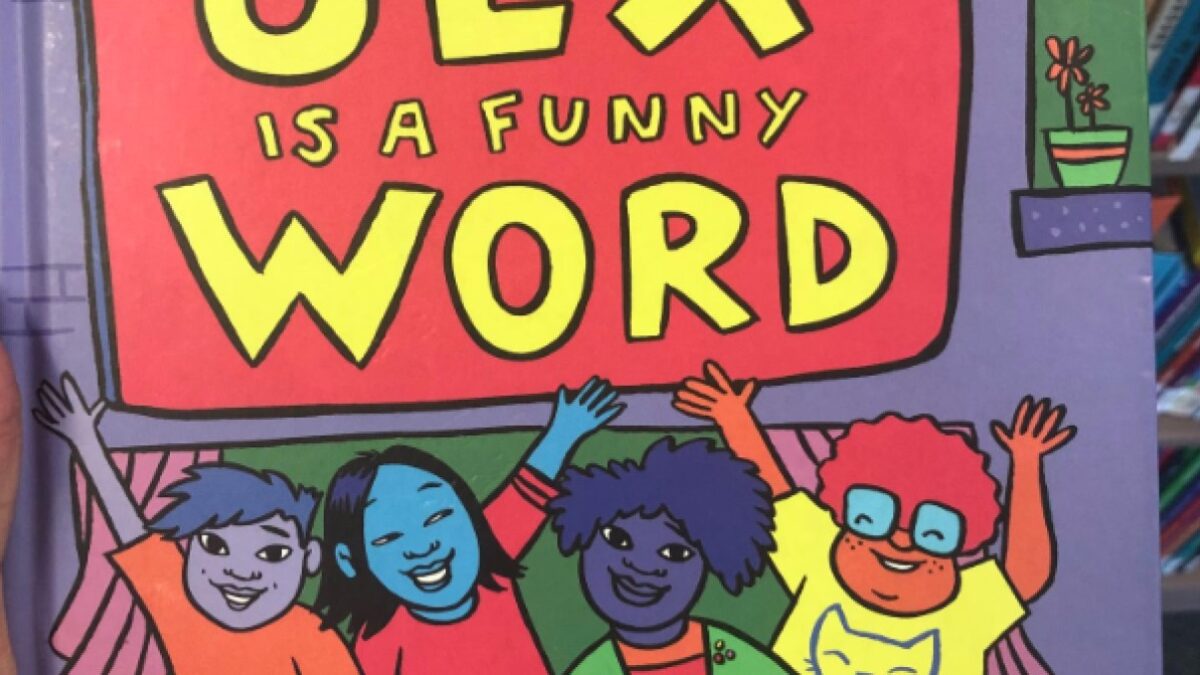This article quotes explicit content about sex.
A book marketed to children ages 7 to 12 that teaches kids to masturbate and affirms gender dysphoria was recently backed by a committee of public librarians in Arkansas after a local parent challenged its place on the shelves.
“Sex Is a Funny Word,” by Cory Silverberg and Fiona Smyth, includes images of a child touching herself in the bathtub and affirmation of gender dysphoria, all aimed at prepubescent kids. A children’s library reviewer described the book in 2016 as a “trans-inclusive sex education book.”
The book, which won top awards from gay activist organizations, “follows a cast of four 8-10 year old kids, including gender queer Zai, as they learn about and explore that strange and funny word — sex.” “Having a penis isn’t what makes you a boy. Having a vulva isn’t what makes you a girl. The truth is much more interesting than that!” the book tells kids.
After a patron’s complaint about the book last month, the Rogers Public Library assembled a committee of six of its librarians, says a letter to the patron dated Aug. 29 from Rogers Library Director Hannah Norris Milligan, obtained this week by The Federalist. The majority of this librarian committee decided to keep this book in the children’s section of the library, where children of any age can find it on the shelves.
The obtained public documents show that Norris Milligan participated on the library’s six-member review committee for the book, recommending that it stay on the library’s shelves “[f]or families that wish to discuss these sensitive topics with their children using a diverse and inclusive resource.”
‘There Is Great Value in This Work’
“There is great value in this work,” wrote Rogers Children’s Library Director Kristin Jones in her response to the book challenge. “This is an excellent book on sex education for children who are nearing or entering puberty. One of the things that makes this book exceptional is that it is inclusive of so many different kinds of children: children without parents, children with disabilities, children who do not consider themselves to be boys or girls, just to name a few.”
Jones recommended the book stay on the library’s children’s nonfiction shelves and as a fit for children ages 8 to 12 whose parents think they are ready to read it.
“What makes this volume exceptional is its introduction of the subjects of transgender identity, intersex conditions, and masturbation,” says a review of the book in the School Library Journal in March 2016, according to the challenge committee’s documentation.
Rogers librarian Lesley Knieriem wrote warmly in favor of the book in her response for the review committee: “In a society that is bombarded with hyper gender-conforming messages in advertising, popular entertainment, and politics, when sexual predation of children by family members and religious leaders is on the news every night, when suicide is the major cause of death for young people who identify as trans, a message of acceptance, hope, encouragement, and self-love is literally life-saving,” she wrote.
Knieriem recommended the book for children ages 7-12, as the documents in her handwriting and with her signature show.
“Sometimes people might feel so ‘uncomfortable or angry’ that they profoundly misread this book, and distort its contents,” she also wrote in her review. “While the book explicitly and repeatedly encourages children to understand and feel at home in their bodies, these people might falsely accuse the book of doing the opposite, especially people who are uninformed or confused about the meaningful and scientifically necessary distinction between ‘physical sex’ and ‘gender’, or unaware that science has shown that puberty can begin as young as age seven and gender awareness as young as three.”
“I cannot think of any work that has this one’s unique and priceless virtues,” Knieriem concluded.
Only one member of the review committee voiced any hesitation about the book’s suitability for the library’s collection for children. Rogers Youth Librarian Evan Day wrote: “The book frames sexuality toward 7-12 year olds in a viewpoint that clashes with the values of a large part of our community, but also is in line with how many also believe. If we are going to start removing titles based on this I’m not sure we could be consistent with the rest of the collection. I believe the library needs to err on the side of having a broad selection and not play toward one side.”
Day also commented: “I don’t know what ‘the line’ is in being explicit in sexual content for 7-12 year olds but a few places seem to run up against it at least: Talking about how it can feel good to have your anus touched was not something I usually expect from a book geared toward this age group (p 66). The section on masturbation is similar (p 109-111).”
Public Funding for Sex Talk Targeting Kids
Rogers, Arkansas, is a Northwest Arkansas town of approximately 71,000 residents in a growing region of the state. Rogers is governed by a Republican mayor, Greg Hines, and represented in the U.S. House of Representatives by another Republican, Steve Womack. Arkansas’s 3rd Congressional District has been represented by Republicans in the House since 1967. The library’s board of trustees is appointed by Rogers’s mayor.
“This book is held by many of the public libraries in Northwest Arkansas, including Bentonville Public Library, Fayetteville Public Library, and Springdale Public Library,” Jones notes in her committee statement.
Norris Milligan notes the book’s awards from LGBT activist groups as one reason her library will continue to use taxpayer-funded resources to teach kids how to touch their genitals in consultation with a “trusted adult” who may or may not be family. “Sex Is a Funny Word” was an American Library Association Notable Children’s Book for 2016 and “has won several awards including the 2016 Stonewall Honor Books in Children’s and Young Adult Literature, and the Normal Fleck Award for Canadian Children’s Non-Fiction,” Norris Milligan notes in the letter.
According to the Toronto Star, this book’s author, Silverberg, and a partner opened a sex shop in Toronto that planned “to hold an off-site sex-education workshop for parents of children aged 7 to 12, one that will focus on more than reproduction.”
Norris Milligan writes that the “professional librarians” who reviewed this book deemed it to be “of value because it is a uniquely inclusive and diverse resource on the topic of sex education that many families in the Rogers community need for their children who have questions about the changes in their bodies or their sexuality.”
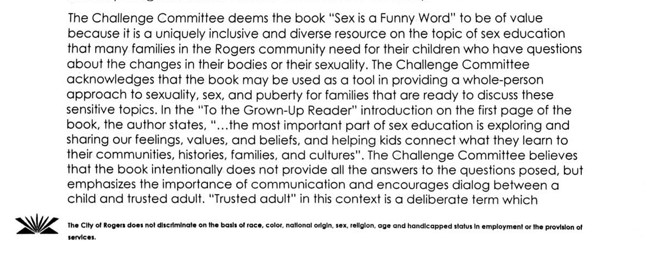
“The Challenge Committee believes,” the letter says, that the book “…encourages dialog between a child and trusted adult” about topics that include masturbation, anal exploration, and sexual disassociation. The letter says it is proper to use the term “trusted adult” in scenarios in which a child may be discussing sex with adults because “it serves to include children with alternative guardian situations.”
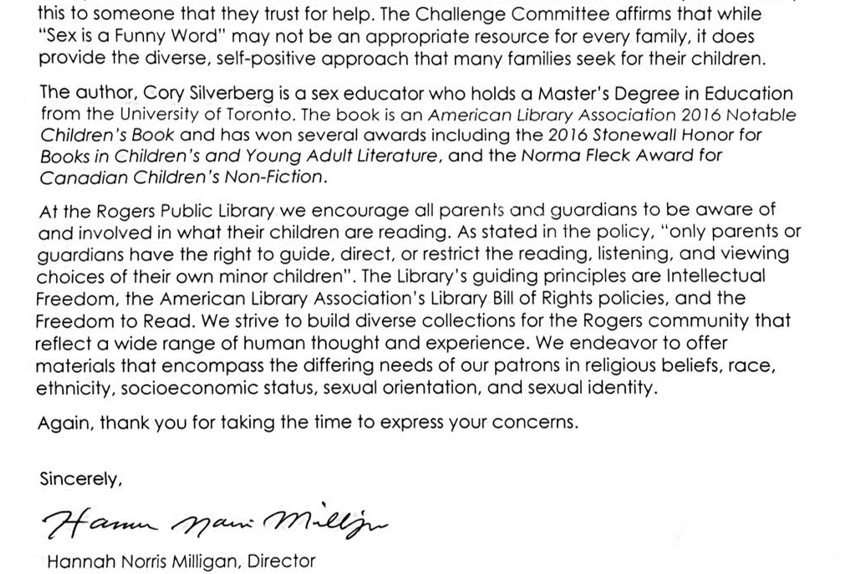
What Else Is Inside This Book (NSFK)
According to The New Philippics blog, which chronicles what’s inside LGBT books for kids and on library shelves all over the nation, “Sex Is a Funny Word” introduces its prepubescent target audience to a variety of explicit sexual behaviors. Here are a few quotes from the book, according to New Philippics: “Like nipples, some people’s breasts are sensitive and can feel good when they are touched.” “Like other holes in the body, the anus is usually very sensitive, which means it can feel good to touch but can also hurt if we are rough with it.”
Here are some images from the book.
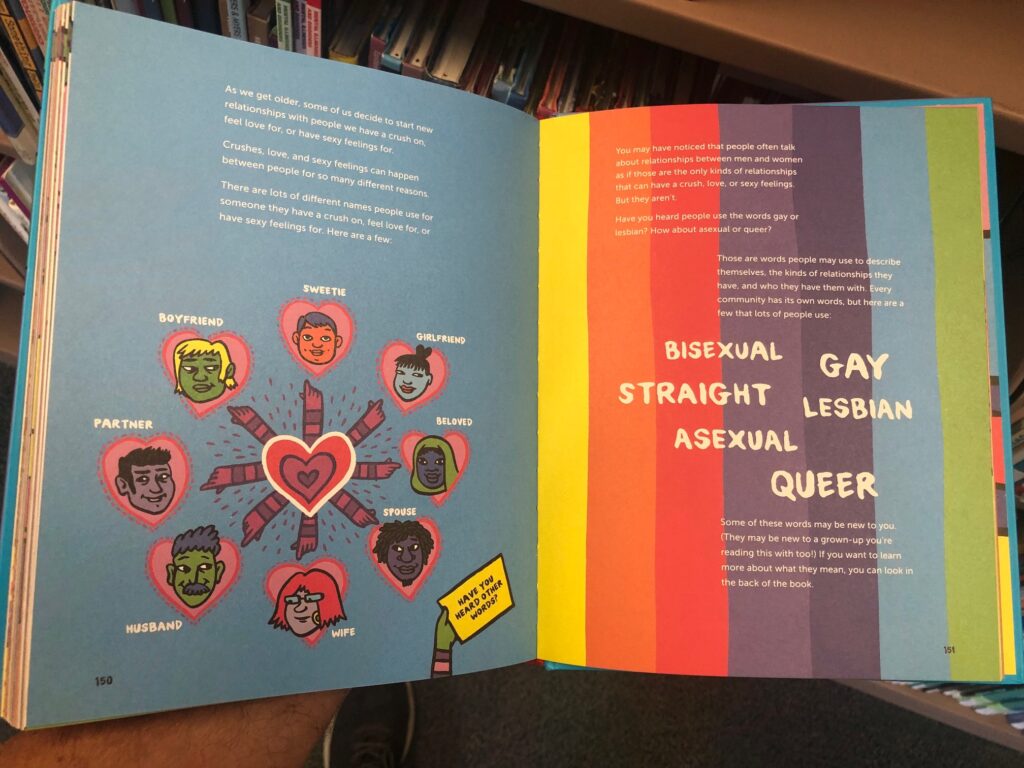
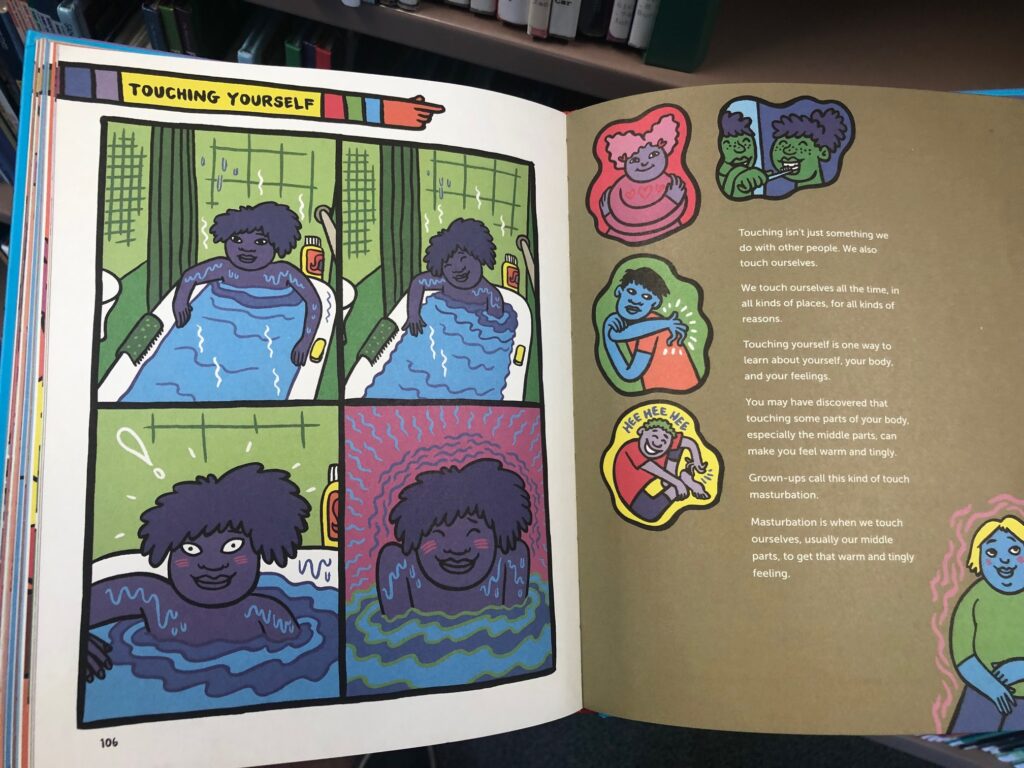
“We endeavor to offer materials that encompass the differing needs of our patrons in religious beliefs, race, ethnicity, socioeconomic status, sexual orientation, and sexual identity,” Norris Milligan concludes in her letter.
Norris Milligan did not respond to Federalist calls for comment, left with a colleague Monday and in a follow-up to her work voicemail on Wednesday.
Challenge Committee Reviews by The Federalist on Scribd
